Rishi Sunak economic statement masterstroke may have saved UK £15bn ‘Every little helps’ | UK | News
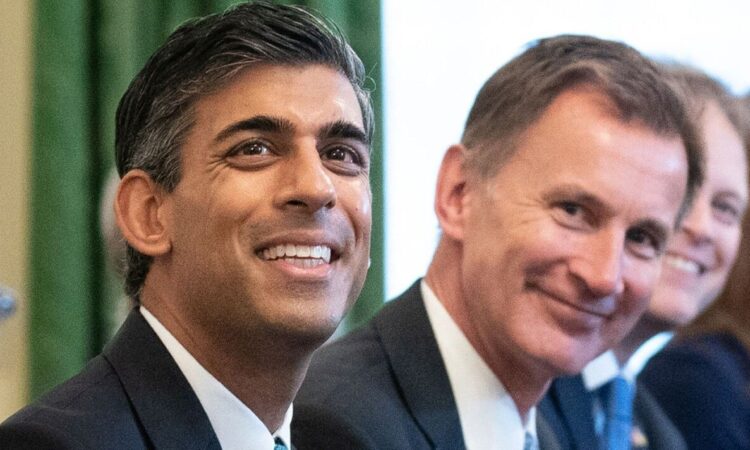
Jeremy Hunt delays financial statement until November 17th
The Prime Minister on Wednesday delayed the announcement of a keenly awaited plan for repairing the country’s public finances until November 17, two-and-a-half weeks later than previously planned. Mr Sunak told parliament: “I have been honest. We will have to take difficult decisions to restore economic stability and confidence.”
“The Chancellor (Jeremy Hunt) will set that out in an autumn statement in just a few weeks.”
The postponement briefly raised British borrowing costs in financial markets, but there was no repeat of the panic bond selling caused by Liz Truss’s September tax-cutting plan.
Bloomberg reports Resolution Foundation Chief Executive Torsten Bell as saying the delay to the economic statement may save up to £15billion, which could help spare the country’s public services from deeper spending cuts.
Christopher Martin, Professor of Economics at the University of Bath, explained that the Government stood to gain from delaying the economic statement, which is to include analysis from the Office for Budget Responsibility (OBR).
He told Express.co.uk: “When the OBR do their forecasts they will use an estimate of what interest rate Government will have to pay for borrowing. By delaying, the interest rate on Government bonds will be lower because of the measures Hunt brought in which stabilised the markets. The OBR can factor in a lower interest rate so the cost of borrowing is lower and there is a smaller hole [in the public finances].”
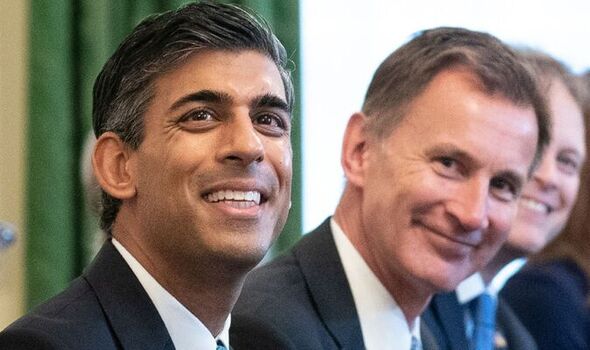
Prime Minister Rishi Sunak and Chancellor Jeremy Hunt (Image: Getty)

A man shops at a greengrocer’s in Cardiff Market (Image: Getty)
Official UK-wide winter energy blackout times pinpointed in worse case scenario
The times that households in the UK could see planned blackouts this winter in a worst-case scenario are detailed in Government emergency planning documents.
The National Grid had previously warned that — thanks to gas supply shortages exacerbated by Russia’s invasion of Ukraine — a series of three-hour power cuts might be necessary, with the goal of reducing total energy consumption by around five percent.
Dr Victoria Honeyman, Associate Professor of British Politics at the University of Leeds, told Express.co.uk there is still an enormous black hole in the public finances, but the delay meant the total was less than that discussed just a couple of weeks ago. She said: “Every little helps.”
She added while the delay did not “scream economic competence”, it appeared the Government had got away with not upsetting the financial markets or public.
On what the Autumn Budget might include, Professor Martin said his impression was that the Government is moving away from spending cuts because of the political difficulties and towards tax rises. He said this could include tweaking an existing windfall tax on energy firms to raise more revenue.
Professor Martin added: “I don’t think [balancing the Government’s books] is urgent. Governments have always borrowed and the level of UK borrowing is relatively low historically. I think the UK could increase borrowing. The problem is financial markets may react badly, but they are not opposed to borrowing, they are opposed to borrowing without a plan as to how we go forward.”
Dr Honeyman said the contents of the Autumn Budget will depend on what the Government views as priorities.
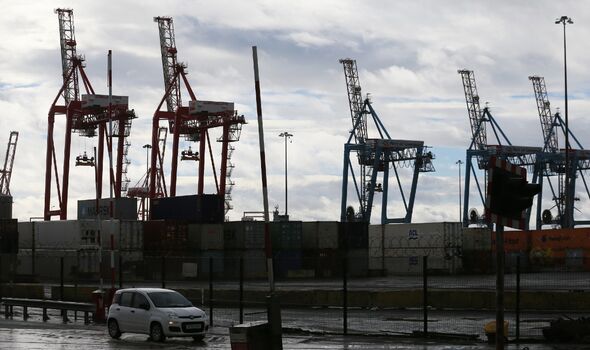
Liverpool Docks in Merseyside where dockers have been on strike (Image: Getty)

Morning commuters exit Liverpool Street railway station in the City of London (Image: Getty)
She suggested ministers could freeze the triple lock on pensions or cut the budgets of departments such as health, education and defence or crack down on benefit fraud.
Dr Honeyman said none of those things would get the Government where it needs to be with freezing the triple lock “problematic” for Mr Sunak as it would impact a large number of voters the Tories rely on during elections.
Cuts to Government departments would be more palatable, but after years of austerity there is little meat left on the bone.
Dr Honeyman explained the cost-of-living crisis has plunged more people in difficulty and not just those already in poverty. Electorally, that could spell disaster for the Tories as swing voters look to blame the Government for making them poorer.
DON’T MISS:
UK’s worst airport named after ‘resources pushed to breaking point’ [REVEALED]
Briton has no regrets after making little girl cry at Disney World [REPORT]
Peru Two cocaine smuggler in glam new look after Netflix show [LATEST]
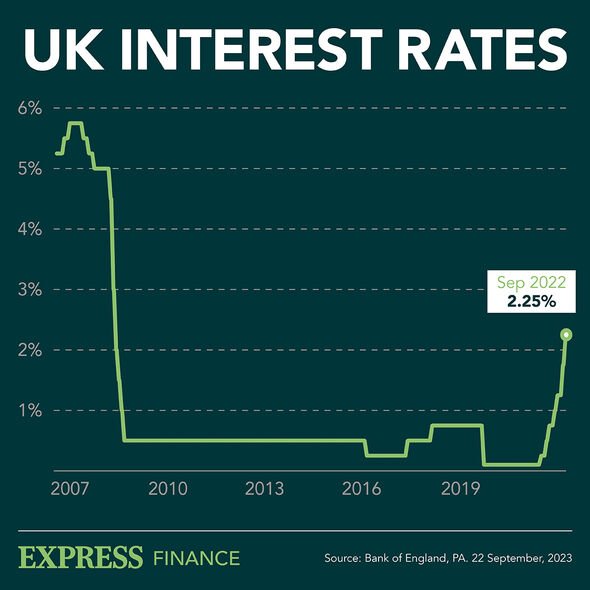
UK interest rate changes (Image: Express)
She said: “The Tories will stick to the narrative it’s a big, international concern. From 2010, the Tories blamed Labour for the state of the country’s finances. That is not possible now. Now Labour will blame the Tories to gain those voters.”
Dr Honeyman said the Government could choose to follow David Cameron and George Osborne’s austerity playbook, but may not.
She added: “My view is they won’t go full tilt towards austerity because it isn’t a vote winner. Austerity was brought in at the start of the coalition Government in 2010 and they had five years to go to the next General Election.
“Assuming they can get to the two year mark [before the next General Election], I don’t see how they can begin austerity, have it bite down hard on people’s lives and show there’s light at the end of the tunnel after two years.”
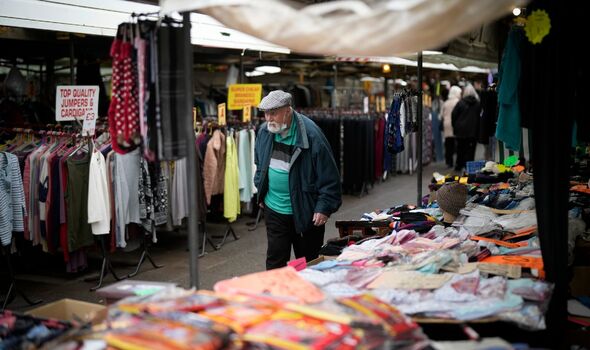
A man walks through Bilston outdoor market in Wolverhampton (Image: Getty)
However, Dr Honeyman did not rule out the prospect of the Government calling an early General Election. She said: “When Liz Truss came to power a lot of people were dismissive of her leadership, but even they didn’t think she would be out in less than 50 days. [Opposition parties] may get an early election.”
On whether the Government can stimulate growth to boost the country’s coffers, Dr Honeyman said in the short term the Government has neither the time nor money to boost Britain’s productivity or provide for the kind of large scale investment needed.
Professor Martin said growth can be generated from Government investment in physical capital and skills. He added investment aimed at improving the health of the UK population would also get the economy growing and boost productivity.
Evarist Stoja, Professor of Finance at the University of Bristol Business School, told Express.co.uk: “The UK economy has a lot of potential in financial technology and artificial intelligence, clean energy and life sciences.
“However, the combined effect of the Brexit challenges, the pandemic, the conflict in Ukraine and finally the mini-budget has made it more difficult to unleash that potential. The Government needs to find a way to achieve this. The biggest question the new PM has is how does the government put the UK economy on a growing path?
“Generally, the Government can do this with two types of tools. Firstly, with large infrastructure investments and tax cuts, so-called fiscal tools. Currently this cannot be the answer as the UK Government is fiscally constrained – too much debt and not enough revenues. You cannot just cut tax when you do not have the money to cover the spending.
“Moreover, inflation is very high which means prices of goods and services rise a lot from one month to the next. As a result, the Bank of England has to intervene to bring prices under control by raising interest rates. The implication of this is the economy will slow to reduce the demand for goods.
“Any action from the Government to stimulate the economy while the Bank of England is trying to slow it, is like a cart being pulled in opposite directions or a driver with one foot on the accelerator and the other on the brake. It just does not work, as the last Government found out in short order.”
Professor Stoja added the second option is to adopt fiscally-neutral tools, meanings things like investment zones, deregulation, easing planning permission rules and emigration.
She said: “None of these are without their own challenges as well as detractors and they only yield results in the medium to long term. The short term is going to be particularly challenging.”






